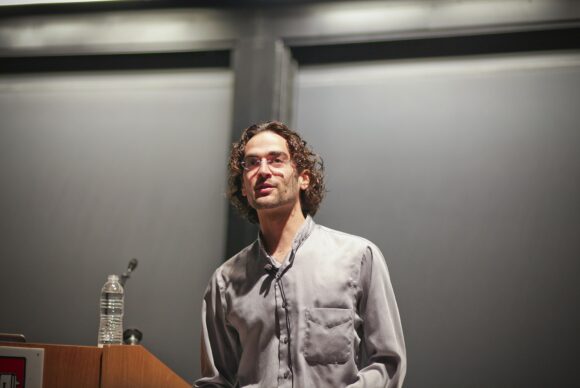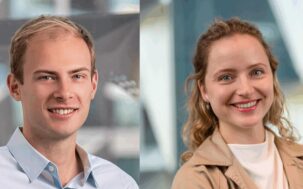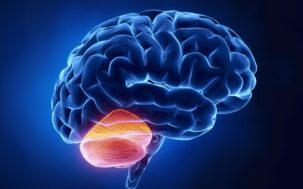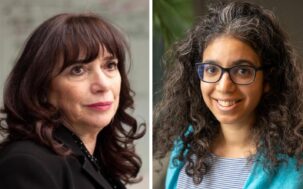Kempner Institute Announces Speaker Lineup for 2024-25 Kempner Seminar Series
Series brings cutting-edge researchers to Harvard for talks about intelligence in natural and artificial systems

This year's first Kempner Seminar Series talk is "Reasoning with Language Models (and People)" by Noah Goodman, Kempner Institute Visiting Scientist and Professor of Psychology and Computer Science at Stanford University.
Photo: jeanbaptisteparis via Wikimedia Commons (CC-SA-2.0 license)
Cambridge, MA– The Kempner Institute for the Study of Natural and Artificial Intelligence at Harvard University is pleased to announce the speaker lineup for the 2024-25 season of the Kempner Seminar Series (KSS), a research-level seminar series that covers topics related to the basis of intelligence in natural and artificial systems.
The series features prominent, cutting-edge experts from academia and industry who study the basis of intelligence, with specialties ranging from machine learning to neuroplasticity. Speakers focus on emerging research topics in artificial intelligence, natural intelligence and the intersection of the two.
The Kempner will kick off the 2024-25 seminar series on Sept. 20 with a talk by Noah Goodman, Kempner Institute Visiting Scientist and Associate Professor of Psychology and Computer Science, and Linguistics (by courtesy) at Stanford University.
Details, including talk titles and abstracts, for the 2024-25 Kempner Seminar Series will be made available on the Kempner Institute Events page. Check back for updates about the series.
The Kempner Seminar Series is held in-person on Fridays and is open to the public.
Kempner Seminar Series 2024-25 Speakers
- Noah Goodman, Kempner Institute Visiting Scientist and Associate Professor of Psychology and Computer Science, and Linguistics (by courtesy) at Stanford University (September 20, 2024)
- Mark Churchland, Associate Professor, Department of Neuroscience at Columbia University and Co-Director of the Grossman Center for the Statistics of Mind (October 4, 2024)
- Scott Linderman, Assistant Professor of Statistics and Institute Scholar in the Wu Tsai Neurosciences Institute at Stanford University (October 11, 2024)
- Jacob Andreas, Associate Professor at MIT in the Department of Electrical Engineering and Computer Science, and the Computer Science and Artificial Intelligence Laboratory (October 18, 2024)
- Eric Schulz, Assistant Professor at Max Planck Institute for Biological Cybernetics (October 25, 2024)
- Ila Fiete, Associate Investigator at the McGovern Institute and Professor of Brain and Cognitive Sciences at MIT (November 1, 2024)
- Ruslan Salakhutdinov, UPMC professor of Computer Science in the Machine Learning Department, School of Computer Science at Carnegie Mellon University (November 8, 2024)
- Michael Tomasello, Distinguished Professor of Psychology and Neuroscience at Duke University and emeritus Director of the Max Planck Institute for Evolutionary Anthropology (November 15, 2024)
- Yoav Goldberg, Professor at Bar Ilan University’s Computer Science Department, and Research Director of the Israeli branch of the Allen Institute for Artificial Intelligence (December 6, 2024)
- Paul Cisek, Professor in the Department of Neuroscience at Université de Montréal (January 10, 2025)
- Stefano Fusi, Professor of Neuroscience at MIT and Principal Investigator at Columbia’s Zuckerman Institute (January 17, 2025)
- Matthew Botvinick, Senior Director of Research, Google DeepMind and Honorary Professor, Gatsby Computational Neuroscience Unit, University College London (January 24, 2025)
- Ali Farhadi, Professor in the Department of Computer Science and Engineering at the University of Washington and CEO of the Allen Institute for Artificial Intelligence (January 31, 2025) (tentative)
- Nanthia Suthana, Associate Professor of Psychiatry, Neurosurgery, Bioengineering and Psychology at UCLA (February 7, 2025)
- Ellie Pavlick, Assistant Professor of Computer Science and Linguistics at Brown University, and Research Scientist at Google Deepmind (February 14, 2025)
- Tim Behrens, Professor of Computational Neuroscience at the University of Oxford (March 14, 2025)
- Tri Dao, Assistant Professor of Computer Science at Princeton University and Chief Scientist at Together AI (April 18, 2025)
- Shari Liu, Assistant Professor of Psychological and Brain Sciences at John Hopkins University (April 25, 2025)
- Konrad Kording, Penn Integrated Knowledge Professor at the University of Pennsylvania (May 2, 2025)
- Andrew Lampinen, Staff Research Scientist, Google Deepmind (May 16, 2025)
- Blake Richards, Associate Professor, McGill University & CIFAR AI Chair, Mila (May 23, 2025)
About the Kempner Institute
The Kempner Institute seeks to understand the basis of intelligence in natural and artificial systems by recruiting and training future generations of researchers to study intelligence from biological, cognitive, engineering, and computational perspectives. Its bold premise is that the fields of natural and artificial intelligence are intimately interconnected; the next generation of artificial intelligence (AI) will require the same principles that our brains use for fast, flexible natural reasoning, and understanding how our brains compute and reason can be elucidated by theories developed for AI. Join the Kempner mailing list to learn more, and to receive updates and news.
PRESS CONTACT:
Deborah Apsel Lang | (617) 495-7993 | kempnercommunications@harvard.edu






